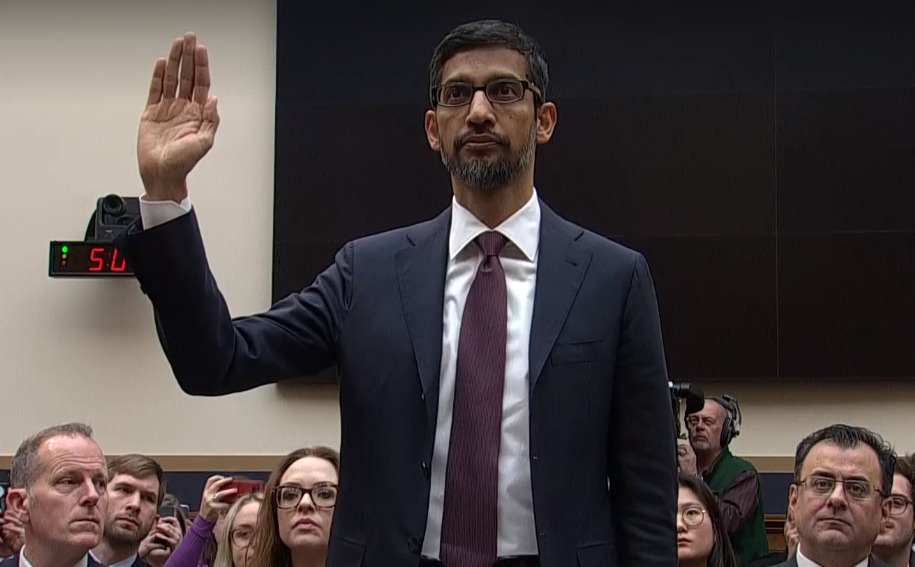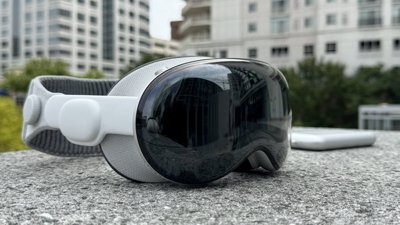Google CEO Sundar Pichai testified in front of a U.S. congressional panel on Tuesday to address a number of issues, above all deflecting suggestions that the company's search results are biased towards one political party or another.
Google's algorithms rank search results "based on over 200 signals," Pichai explained, including "things like relevance, freshness, popularity, how other people are using it." Those results are then evaluated by external raters, who Pichai said use a set of objective guidelines.
"This is working at scale, and we don't manually intervene on any particular search result," Pichai told one panel member, Democrat Representative Zoe Lofgren from California.
.@RepCohen asks Google CEO to look into "the over-use of conservative news organizations," citing fact that when people search for his MSNBC appearances, it often takes them to Daily Caller articles. pic.twitter.com/kmEXYqhq9x
— Aaron Rupar (@atrupar) December 11, 2018
Some Republicans including President Donald Trump have complained that Google search results are biased, favoring liberal news sources. Trump in particular has called Google searches "rigged" to show negative stories about him.
Pichai admitted that being based where it is in California, many of Google's workers may lean liberal, but the CEO added that he and the rest of the company are committed to being politically fair — and no individual employee can skew search results. This was challenged by the panel, that claimed that neutral algorithms can still produce skewed results with concerted effort by a larger public influencing relevancy.
Another topic of the panel was Google's interest in returning to China, which it has been barred from since 2010 because of the Communist Party's censorship policies. Critics — including many on Google's staff — have worried that the company is willing to build a compromised search engine that hides things like the 1989 massacre of pro-democracy protestors in Beijing.
Pichai claimed that the company has "no plans" to launch in China, even though it has "developed and looked at what search could look like" with a team of over 100 people. He further insisted that there are no ongoing talks with the Chinese government, and that Google will be "fully transparent" with U.S. officials if search ever does go back.
Domestic privacy was the third pillar of Pichai's testimony. The executive spent time explaining how and why Google collects data, insisting that the company gives people control over what's collected, and that it regularly prompts people to check their privacy settings. The company has come under fire for collecting massive amounts of information about people for the sake of advertisers, and/or failing to disclose a Google+ vulnerability that could have exposed the private profile information of some 52.5 million people. Google+ is now scheduled to shut down in April, having originally been expected to wind down in August.
Congress seemed mostly unable to identify what phones they were using during the testimony, with one notable point of confusion between Android-powered devices and Apple's iPhones, and the fact that Google doesn't manufacture the iPhone. For the most part, congressional members seemed disinterested in the testimony as a whole, with many of them not having a good handle on the subject matter, amplified by most of them appearing just before their question period, and vanishing thereafter.
After @SteveKingIA raises inscrutable concerns about iPhones, Google CEO Sunday Pichai patiently informs him, "Congressman, iPhone is made by a different company." pic.twitter.com/TiNZ1t3VRo
— Aaron Rupar (@atrupar) December 11, 2018
 Roger Fingas
Roger Fingas







-m.jpg)






 William Gallagher
William Gallagher
 Malcolm Owen
Malcolm Owen


 Chip Loder
Chip Loder
 Mike Wuerthele
Mike Wuerthele



-m.jpg)






86 Comments
You know the rules -- and if you don't, a link to them is at the bottom of every forum page. Don't be jerks to each other.
I watched much of the hearing. Many of our representatives seemed to have some preconceptions that kept them from understanding (hearing?) the answers Google's CEO offered and so instead kept rephasing or repeating the question if it wasn't getting the reply they expected.
One of the funnier moments was when one of them asked how his 7-year old granddaughters iPhone popped up a profane photo of her grandfather while she was playing a game and Pichai answered that he couldn't really say since the iPhone is not a Google product. That Congressman immediately yielded the rest of his time to another.
:)
Edit: In the first read I missed that the author mentioned that same humorous moment.
Well, if he said that there is no bias, then there is no bias. Case closed. /s
While we see some combat between technically uninformed politicians and tech companies, and while the tech companies hold a lot of influence themselves, the two different forces are still connected, maybe even aligned, via money. Right now they’re playing a game of tug of war, each party blaming media and tech companies for letting the other party be visible... but the thing that is wrecking search engine results isn’t political affiliation; it’s pathological capitalism.
Every search is compromised by “SEO”. Fake content (not “fake news”; actual fake content) comes up more than real content. All designed to ensure advertisers get eyes on their ads. Entire websites designed not to serve real content but to drive traffic to other content, or, again, just shove ads. I remember when search engines were actually useful, on the first page of search results. Now it takes considerable time and effort to wade through all the garbage to find any actual information.
What about that bias, Pichai? I stopped using Google as much as possible but it’s not just Google. DuckDuckGo suffers the same. So do the others. Is anyone developing tech to stop the tech that wrecks the usefulness of tech?
I’m wondering if we need to consider the corporations, or maybe the 1% itself, as a sort of “political party”. Regardless of which of our duopoly parties is in power in the USA, there’s still one alignment they all share: their ability to move between corporate jobs and political offices, and the pursuit/maintenance of their wealth and power. It certainly makes them stand out from the rest of us as a kind of entity of their own.
It can be very difficult to believe someone in an authoritative position because too many times we’ve seen people like that clearly lie, even testifying in court. They play games with words or facts that any idiot knows is a lie but at face value eludes accountability.
Who knows if he’s telling the truth, but I wouldn’t be surprised if he wasn’t and that he was being knowingly misleading.